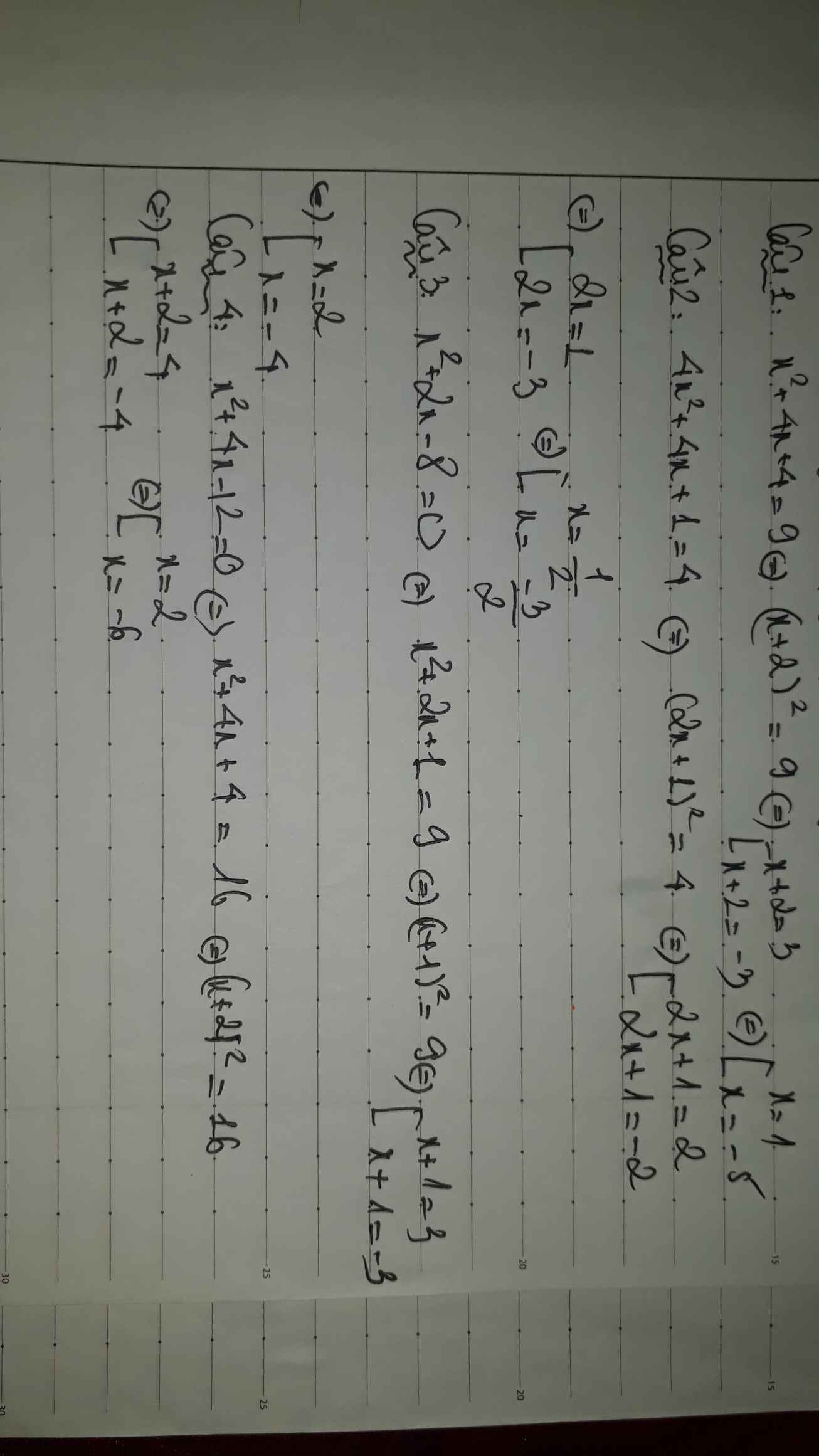Hãy nhập câu hỏi của bạn vào đây, nếu là tài khoản VIP, bạn sẽ được ưu tiên trả lời.
Giải phương trình
e) x4 -4x3-8x2+8x=0
f) 2x2+3xy+y2=0
g) 2x4-x3-9x2+13x-5=0
h) (x+1)(x+3)(x+5)(x+7)+15=0

e: =>x(x^3-4x^2-8x+8)=0
=>x[(x^3+8)-4x(x+2)]=0
=>x(x+2)(x^2-2x+4-4x)=0
=>x(x+2)(x^2-6x+4)=0
=>\(x\in\left\{0;-2;3+\sqrt{5};3-\sqrt{5}\right\}\)
g: =>2x^4+5x^3-6x^3-15x^2+6x^2+15x-2x-5=0
=>(2x+5)(x^3-3x^2+3x-1)=0
=>(2x+5)(x-1)^3=0
=>x=1 hoặc x=-5/2
h: =>(x^2+8x+7)(x^2+8x+15)+15=0
=>(x^2+8x)^2+22(x^2+8x)+120=0
=>(x^2+8x+10)(x^2+8x+12)=0
=>(x^2+8x+10)(x+2)(x+6)=0
=>\(x\in\left\{-2;-6;-4+\sqrt{6};-4-\sqrt{6}\right\}\)

Câu 9:
\(\Leftrightarrow\left(x-2\right)\left(x-1\right)\left(x+1\right)=0\)
\(\Leftrightarrow\left[{}\begin{matrix}x=2\\x=1\\x=-1\end{matrix}\right.\)
\(9,\Leftrightarrow x^2\left(x-2\right)-\left(x-2\right)=0\\ \Leftrightarrow\left(x-2\right)\left(x-1\right)\left(x+1\right)=0\\ \Leftrightarrow\left[{}\begin{matrix}x=1\\x=-1\\x=2\end{matrix}\right.\\ 11,\Leftrightarrow x^2+5x-x-5=0\\ \Leftrightarrow\left(x+5\right)\left(x-1\right)=0\\ \Leftrightarrow\left[{}\begin{matrix}x=1\\x=-5\end{matrix}\right.\\ 12,\Leftrightarrow\left(x+1\right)^2-36=0\\ \Leftrightarrow\left(x+7\right)\left(x-5\right)=0\\ \Leftrightarrow\left[{}\begin{matrix}x=-7\\x=5\end{matrix}\right.\\ 13,\Leftrightarrow x^3-25x-x^3-8=17\\ \Leftrightarrow-25x=25\Leftrightarrow x=-1\\ 14,\Leftrightarrow x\left(2x^2+8x-3x-12\right)=0\\ \Leftrightarrow x\left(x+4\right)\left(2x-3\right)=0\\ \Leftrightarrow\left[{}\begin{matrix}x=0\\x=-4\\x=\dfrac{3}{2}\end{matrix}\right.\)

1: \(\Leftrightarrow\left(x-3\right)\left(x+3\right)-\left(x-3\right)\left(5x+2\right)=0\)
\(\Leftrightarrow\left(x-3\right)\left(-4x+1\right)=0\)
hay \(x\in\left\{3;\dfrac{1}{4}\right\}\)
2: \(\Leftrightarrow\left(x-1\right)\left(x^2+x+1\right)-\left(x-1\right)\left(x^2-2x+16\right)=0\)
\(\Leftrightarrow\left(x-1\right)\left(x^2+x+1-x^2+2x-16\right)=0\)
\(\Leftrightarrow\left(x-1\right)\left(3x-15\right)=0\)
hay \(x\in\left\{1;5\right\}\)
3: \(\Leftrightarrow\left(x-1\right)\left(4x^2-1\right)=0\)
\(\Leftrightarrow\left(x-1\right)\left(2x-1\right)\left(2x+1\right)=0\)
hay \(x\in\left\{1;\dfrac{1}{2};-\dfrac{1}{2}\right\}\)
4: \(\Leftrightarrow x^2\left(x+4\right)-9\left(x+4\right)=0\)
\(\Leftrightarrow\left(x+4\right)\left(x-3\right)\left(x+3\right)=0\)
hay \(x\in\left\{-4;3;-3\right\}\)
5: \(\Leftrightarrow\left[{}\begin{matrix}3x+5=x-1\\3x+5=1-x\end{matrix}\right.\Leftrightarrow\left[{}\begin{matrix}2x=-6\\4x=-4\end{matrix}\right.\Leftrightarrow\left[{}\begin{matrix}x=-3\\x=-1\end{matrix}\right.\)
6: \(\Leftrightarrow\left(6x+3\right)^2-\left(2x-10\right)^2=0\)
\(\Leftrightarrow\left(6x+3-2x+10\right)\left(6x+3+2x-10\right)=0\)
\(\Leftrightarrow\left(4x+13\right)\left(8x-7\right)=0\)
hay \(x\in\left\{-\dfrac{13}{4};\dfrac{7}{8}\right\}\)
1.
\(\Leftrightarrow\left(x-3\right)\left(x+3\right)=\left(x-3\right)\left(5x-2\right)\)
\(\Leftrightarrow x+3=5x-2\)
\(\Leftrightarrow4x=5\Leftrightarrow x=\dfrac{5}{4}\)
2.
\(\Leftrightarrow\left(x-1\right)\left(x^2+x+1\right)=\left(x-1\right)\left(x^2-2x+16\right)\)
\(\Leftrightarrow x^2+x+1=x^2-2x+16\)
\(\Leftrightarrow3x=15\Leftrightarrow x=5\)
3.
\(\Leftrightarrow4x^2\left(x-1\right)-\left(x-1\right)=0\)
\(\Leftrightarrow\left(x-1\right)\left(4x^2-1\right)=0\)
\(\Leftrightarrow\left[{}\begin{matrix}x=1\\x=\dfrac{1}{2};x=-\dfrac{1}{2}\end{matrix}\right.\)

a, \(\Leftrightarrow\left(9x^2-4\right)\left(x+1\right)-\left(3x+2\right)\left(x-1\right)\left(x+1\right)=0\)
\(\Leftrightarrow\left(x+1\right)\left(\left(9x^2-4\right)-\left(\left(3x+2\right)\left(x-1\right)\right)\right)=0\)
\(\Leftrightarrow\left(x+1\right)\left(9x^2-4-\left(3x^2-x-2\right)\right)=0\)
\(\Leftrightarrow\left(x+1\right)\left(9x^2-4-3x^2+x+2\right)=0\)
\(\Leftrightarrow\left(x+1\right)\left(3x^2+x-2\right)=0\)
\(\Leftrightarrow\left(x+1\right)=0;3x^2+x-2=0\)
=> x=-1
với \(3x^2+x-2=0\)
ta sử dụng công thức bậc 2 suy ra : \(x=\dfrac{2}{3};x=-1\)
Vậy ghiệm của pt trên \(S\in\left\{-1;\dfrac{2}{3}\right\}\)
b: \(\Leftrightarrow x^2-2x+1-1+x^2=x+3-x^2-3x\)
\(\Leftrightarrow2x^2-2x=-x^2-2x+3\)
\(\Leftrightarrow3x^2=3\)
hay \(x\in\left\{1;-1\right\}\)
c: \(\Leftrightarrow\left(x-1\right)\left(x+1\right)\left(x+2\right)\left(x-3\right)-\left(x-1\right)\left(x-2\right)\left(x+2\right)\left(x+5\right)=0\)
\(\Leftrightarrow\left(x-1\right)\left(x+2\right)\left[\left(x+1\right)\left(x-3\right)-\left(x-2\right)\left(x+5\right)\right]=0\)
\(\Leftrightarrow\left(x-1\right)\left(x+2\right)\left(x^2-2x-3-x^2-3x+10\right)=0\)
\(\Leftrightarrow\left(x-1\right)\left(x+2\right)\left(-5x+7\right)=0\)
hay \(x\in\left\{1;-2;\dfrac{7}{5}\right\}\)

Câu 1:
Ta có: \(x^2-5x+4=0\)
\(\Leftrightarrow x^2-x-4x+4=0\)
\(\Leftrightarrow\left(x-1\right)\left(x-4\right)=0\)
\(\Leftrightarrow\left[{}\begin{matrix}x=1\\x=4\end{matrix}\right.\)
Vậy: S={1;4}
Câu 2:
Ta có: \(3x^2-7x+3=0\)
\(\Delta=\left(-7\right)^2-4\cdot3\cdot3=49-36=13\)
Vì Δ>0 nên phương trình có hai nghiệm phân biệt là:
\(\left\{{}\begin{matrix}x_1=\dfrac{7-\sqrt{13}}{6}\\x_2=\dfrac{7+\sqrt{13}}{6}\end{matrix}\right.\)
Vậy: \(S=\left\{\dfrac{7-\sqrt{13}}{6};\dfrac{7+\sqrt{13}}{6}\right\}\)
Câu 3:
Ta có: \(5x^2-x-4=0\)
\(\Leftrightarrow\left(x-1\right)\left(5x+4\right)=0\)
\(\Leftrightarrow\left[{}\begin{matrix}x=1\\x=-\dfrac{4}{5}\end{matrix}\right.\)
Vậy: \(S=\left\{1;-\dfrac{4}{5}\right\}\)
Câu 4:
Ta có: \(7x^2+x-8=0\)
\(\Leftrightarrow\left(x-1\right)\left(7x+8\right)=0\)
\(\Leftrightarrow\left[{}\begin{matrix}x=1\\x=-\dfrac{8}{7}\end{matrix}\right.\)
Vậy: \(S=\left\{1;-\dfrac{8}{7}\right\}\)
Câu 1x^2-5x+4=0
<=>(x-1)(x-4)=0
<=>[x=1;x=4
Câu 2 3x^2-7x+3=0
x=7/6-căn bậc hai(13)/6, x=căn bậc hai(13)/6+7/6
x=7/6-căn bậc hai(13)/6, x=căn bậc hai(13)/6+7/6
Câu 3 5*x^2 -x-4 = 0
x=-4/5, x=1
Câu 4 7*x^2 +x-8 = 0
x=-8/7, x=1
bn ơi mk giải thế có chỗ nào ko hiểu bn có thể hỏi mk nhé

Câu 1:
a) Ta có: 7x+21=0
\(\Leftrightarrow7x=-21\)
hay x=-3
Vậy: S={-3}
b) Ta có: 3x-2=2x-3
\(\Leftrightarrow3x-2-2x+3=0\)
\(\Leftrightarrow x+1=0\)
hay x=-1
Vậy: S={-1}
c) Ta có: 5x-2x-24=0
\(\Leftrightarrow3x=24\)
hay x=8
Vậy: S={8}
Câu 2:
a) Ta có: \(\left(2x+1\right)\left(x-1\right)=0\)
\(\Leftrightarrow\left[{}\begin{matrix}2x+1=0\\x-1=0\end{matrix}\right.\Leftrightarrow\left[{}\begin{matrix}2x=-1\\x=1\end{matrix}\right.\Leftrightarrow\left[{}\begin{matrix}x=-\dfrac{1}{2}\\x=1\end{matrix}\right.\)
Vậy: \(S=\left\{-\dfrac{1}{2};1\right\}\)
b) Ta có: \(\left(2x-3\right)\left(-x+7\right)=0\)
\(\Leftrightarrow\left[{}\begin{matrix}2x-3=0\\-x+7=0\end{matrix}\right.\Leftrightarrow\left[{}\begin{matrix}2x=3\\-x=-7\end{matrix}\right.\Leftrightarrow\left[{}\begin{matrix}x=\dfrac{3}{2}\\x=7\end{matrix}\right.\)
Vậy: \(S=\left\{\dfrac{3}{2};7\right\}\)
c) Ta có: \(\left(x+3\right)^3-9\left(x+3\right)=0\)
\(\Leftrightarrow\left(x+3\right)\left[\left(x+3\right)^2-9\right]=0\)
\(\Leftrightarrow\left(x+3\right)\left(x+3-3\right)\left(x+3+3\right)=0\)
\(\Leftrightarrow x\left(x+3\right)\left(x+6\right)=0\)
\(\Leftrightarrow\left[{}\begin{matrix}x=0\\x+3=0\\x+6=0\end{matrix}\right.\Leftrightarrow\left[{}\begin{matrix}x=0\\x=-3\\x=-6\end{matrix}\right.\)
Vậy: S={0;-3;-6}

d: Ta có: \(\left(x+1\right)\left(x+2\right)\left(x+3\right)\left(x+4\right)=24\)
\(\Leftrightarrow\left(x^2+5x+4\right)\left(x^2+5x+6\right)-24=0\)
\(\Leftrightarrow x\left(x+5\right)=0\)
\(\Leftrightarrow\left[{}\begin{matrix}x=0\\x=-5\end{matrix}\right.\)



Đặt x làm thừa số chung là ra đó bạn
phương trình đa thức đối xứng